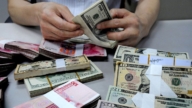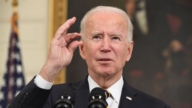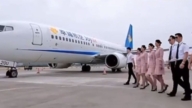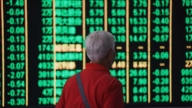【新唐人2014年01月18日讯】自2008年以来,美国处在金融危机的中心,甚至一度面临债务违约的风险。那么,目前已经与21个国家和地区的货币当局,达成了货币互换协定的人民币,能取代美元成为国际避险货币吗?请看以下分析报导。
美国经济学家埃斯瓦尔•普拉萨德(Eswar Prasad)指出,自金融危机以来,美元作为避险货币的功能非但没有下降,反而得到了加强。
埃斯瓦尔作为美国智库“布鲁金斯学会”的高级研究员,他解释说,“全球都依赖美元的安全。国际投资者很有信心,认为美元的价值不会完全受到破坏。”
实际上,现在美元的价格与金融危机前相比,基本持平。
埃斯瓦尔指出,国际投资者认为,美国政府在任何情况下不会违约。他们对美元的信任来自美国完善的金融体系和政治体系。所以,他们在国际金融困境的时候,为了保护自己就会转向美元,特别是美国债券。
埃斯瓦尔还说,美国政府也不愿意使用通货膨胀等手段,来降低债务的价值,因为那样会伤害国际投资者,也会伤害美国国内的投资者。
埃斯瓦尔•普拉萨德曾经担任“国际货币基金组织(IMF)”中国部的主任,他在新书——《美元陷阱》中也指出,世界仍然深陷美元的控制之下。他认为,人民币很难撼动美元作为国际避险货币的地位,主要的原因是中国的政治体系。
他表示:“考虑到目前中国的政治制度以及脆弱的法律框架,很难看到外国投资者前往中国的目地不是为了寻求更高的投资回报,而是为了避险。”
美国“南卡罗莱纳大学艾肯商学院”教授谢田指出,美国,作为自由民主国家的典范,无论是从政治体制也好、经济实力也好,还是从军事实力、社会文化实力和道德感召力上,都是其他任何国家目前不能相比的。
谢田美国南卡罗莱纳大学艾肯商学院教授谢田:“现在美国经济完全摆脱了衰退,现在年经济增长率已经达到2%到3%;欧洲国家还在经济危机中挣扎,日本也试图走出经济危机,而中国现在刚刚进入经济危机。在这种情况下,美元是无可置疑的作为避险货币首选。”
美国财政部16号公布的资料显示,中共在去年11月,再度增加持有美国国债122亿美元,这也是中共连续第3个月的增持,同时也使得中共持有美国国债的总额达到1万3167亿美元。
而中国人民银行15号宣布,大陆外汇储备总额,去年来到3万8200亿美元,比前一年——2012年增长了5097亿美元。外汇储备余额及年度增幅都创历史新高。
谢田指出,中共自己储备大量外汇说明,他们对人民币没有信心。目前,人民币对美元汇率也在不断攀升,中间价已经接近了6,也创2005年以来的新高。但是令人惊奇的是,大陆广义货币存量(M2)从2005年底的30万亿元,激增到了2013年底的107万9300亿元。8年间货币增长3倍多,而美国只增长了55%。
1月16号的《纽约时报》对此指出,中国的资金浪潮已经导致资产价格飞涨,房价持续飙升,也加深了人们对泡沫的恐惧,也让几乎所有人都感到拮据。
大陆《经济参考报》的评论也认为,人民币“外升内贬”坑苦了中国老百姓。
大陆金融分析师任中道:“中共作为世界上最大的印钞机,它不断的在印钞票,M2广义货币的供应量,早就超过美国货币发行量的1.5倍了。”
谢田:“中共滥发货币、滥印钞票,已经导致国内两位数的通货膨胀。实际上,中共政权在金融上面临更大的危机,不管是房地产的泡沫、还是衰退的股市,还是成‘天量’ 的地方债务。”
谢田指出,习惯性用“印钞票”解决问题的中共,最后经济崩溃不可避免。而经济的崩溃,自然又会导致中共政权的崩溃。
采访/易如 编辑/宋风 后制/孙宁
Dollar vs RMB—Which one is safe for investors?
Since 2008, the United States has been at the center of the
financial storm, and even once faced the risk of debt default.
While China has reached currency swap agreement with 21
countries and regions, will the RMB replace the dollar and
become the dominant reserve currency?
Please see our analysis.
Economist Eswar Prasad pointed out that despite the upheaval
in the U.S. economy, the U.S. dollar remains the dominant
reserve currency.
Eswar Prasad is a Senior Fellow at the Brookings Institution,
the American think tank.
He explained the world relies on the security of the dollar,
which “the rest of the world has a great deal of trust in.”
In fact, the dollar holds its power even during the financial crisis.
Eswar Prasad said that international investors will always turn
to the dollar because of the
“deep financial markets, a powerful central bank and legal
framework the rest of the world has a great deal of trust in."
Eswar Prasad also indicated that the U.S. will not resort to
inflation to reduce debt, this could damage both international
investors as well as American investors.
Eswar Prasad, former head of the Financial Studies
Division and the China Division at the IMF, International
Monetary Fund.
In his new book, “The Dollar Trap", he believes that the
dollar will remain as the dominant reserve currency.
The RMB will not displace the dollar any time soon because
of China’s political system.
He indicated that given the current political system and the
legal framework in China, it’s unlikely China will be viewed
as a safe haven for investors, but rather a diversified reserve.
Xie Tian, Professor of Marketing at the University of South
Carolina Aiken indicates that:
as a world model in politics, economy, military, social and
culture, and the moral appeal, the United States has the
strength that no other democratic country could compare.
Xie Tian, professor of Marketing at University of South
Carolina Aiken: “The United States is now completely out of
recession with annual economic growth of 2% to 3%.
European countries are still struggling, so is Japan.
While China is just entering the economic crisis.
In this case, the dollar has undoubtedly become the safe haven
as the reserve currency."
According to the Treasury International Capital report,
China, the largest foreign holder of the bills, boosted its
holdings by $12.2 billion USD to $1.32 trillion USD,
– a record high.
China’s foreign exchange reserves rose to $ 3.82 trillion USD
at the end of 2013, which is $ 509.7 billion more than
a year earlier, the People’s Bank of China said on Wednesday.
Both foreign exchange reserves and the annual growth rate
have reached a record high.
Xie Tian points out that China’s large foreign exchange reserve
reflects the Communist regime’s lack of confidence.
The exchange rate between dollars and RMB is close to 6,
a new high since 2005.
The balance of M2, China’s broadest measure of money supply,
recorded 107.93 trillion yuan ($17.78 trillion), in December 2013,
from 30 trillion yuan ($4.942 trillion) at the end of 2005.
That is a 218% growth in eight years,
while the United States only experienced a growth of 55%.
The New York Times indicated in its January 16 report that
because of the amount of money sloshing around China’s
economy,housing prices have soared, feeding fears of a bubble,
while leaving many ordinary Chinese people feeling poor
and left out.
An economic column in China also reported that:
Chinese people have become the ultimate scapegoat of the
appreciation of the RMB overseas, but depreciation domestically.
Ren Zhongdao, financial analyst: “The Communist regime has
become the world’s largest cash printing machine.
According to the Chinese broad measure,
the RMB supply has exceeded 1.5 times that of the dollar."
Xie Tian: “There has been a double-digit inflation in China
because of the abusive printing of the RMB by the Communist
regime.
In fact, the regime is facing an even greater financial crisis,
whether it is the real estate bubble, the declining stock market,
or the immeasurable local debts."
Xie Tian points out that the final economic collapse is inevitable
in China, on account of the habitual cash printing of the regime.
He believes that the economic collapse would naturally lead to
the collapse of the communist regime.
Interview/YiRu Edit/SongFeng Post-Production/SunNing


























